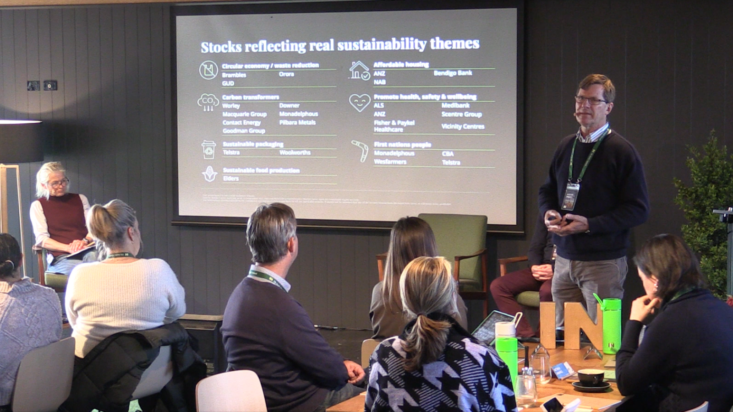Investment managers get more active on ESG engagement and accountability
Investment management teams have several ways they can approach ESG issues with the companies they invest in. On one end of the spectrum is engagement, the other divestment. While most have ESG screens to filter out companies that don’t meet their sustainability standards, the engagement piece is one they all approach differently.
Traditionally the purview of private equity players, direct engagement is something more investment managers are seeing as a crucial piece of the ownership puzzle. For global active equity specialist Martin Currie, an “active ownership” approach is standard.
Speaking at The Inside Network’s recent ESG Retreat in Triabunna, Tasmania last week, Martin Currie portfolio manager Will Baylis (pictured) detailed some of the large company stocks they had identified as reflecting real sustainability themes, including Macquarie Group, Monadelphous, Telstra, Woolworths, ANZ and Bendigo Bank and Scentre Group.
Understandably, not all those companies look at sustainability through the same lens. Large companies might be looking at mitigating their own community arbitrage (ie Woolworths increasing sustainable packaging), or using its position to help the needy (the banks supporting affordable housing).
Bayliss highlighted Coca-Cola Amatil Coca-Cola Amatil as an example of a large company that Martin Currie has successfully engaged with to increase their sustainability credentials – in a very localised way. Concerned about the dangers of “full-sugar” soft drinks on people in the Pacific Islands, they approached the company’s then-CEO to discuss the ways they could mitigate the damage to people in Fiji and Papua New Guinea.
“So they went to both governments in Papua New Guinea and Fiji and engaged with them,” he recalled. “And as a consequence we got verification that they were now providing education to Pacific Islanders on the dangers of drinking fully sugared and carbonated soft drink.
“That I thought was a really good example of how you can impact a company’s behaviour, in this case on Pacific Islanders,” Baylis said.
Better ways to run a business
Also on the panel, Stewart Investors investment specialist Pablo Berrutti reinforced the belief that investors will walk away from managers if they don’t think those managers are selecting companies that do the right thing. “The quickest way to lose someone’s money is to back the wrong people,” he said.
Earlier at the ESG Retreat, the group had heard from Australasian Centre for Corporate Responsibility (ACCR) executive director Brynn O’Brien on the group’s efforts at helping institutional investors escalate their engagements with listed companies. Berrutti said it was “absolutely critical” groups like the ACCR held companies to account for their activities and behaviours. “I think we all need to step up and hold [large emitting] companies accountable,” he added.
Continuing a theme that was reiterated a number of times at the event, Berutti said there was “no reason” institutional investors should expect activity that is harmful or negligent from these companies.
“There are better ways to run businesses. You can run successful, profitable businesses that are making the world a better place.”
The investment specialist said Stewart Investors had identified a couple of characteristics that highlighted stewards that are able to do this. “The first and most fundamental one relates to the timeline,” he said, explaining that long-term thinking was an essential baseline for sustainable business activity.
One other common trait, while not exclusive, is family-led businesses.
“They tend to have a broader-than-profit purpose that sits at the heart of heir business and they’re able to do that because they have control of the company and they don’t have to deal with the bleating of shareholders,” he said. “They’re also thinking about legacy, the future of their kids.”











